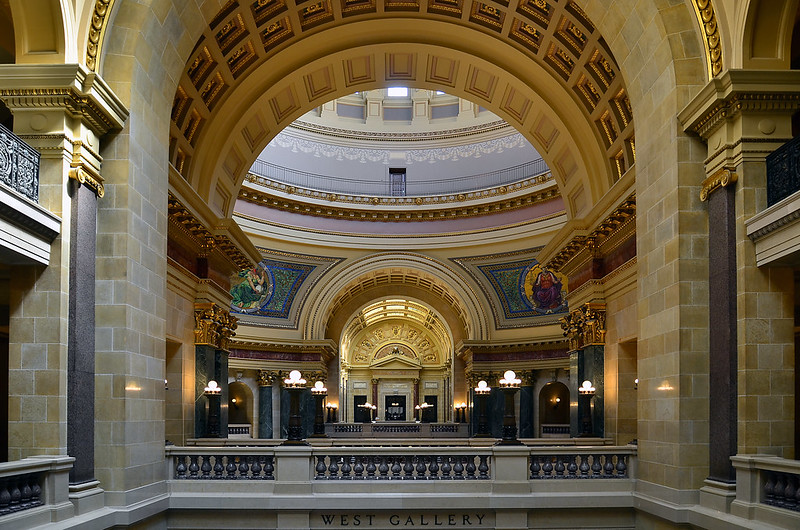A federal court has ruled Wisconsin’s Republican-drawn legislative map unconstitutional, saying the plan constitutes a partisan gerrymander.
In a 2-1 decision from a special panel of federal judges, the court agreed with a group of Democratic plaintiffs that the redistricting plan had systematically diluted the voting strength of Democratic voters.
“We find that Act 43 was intended to burden the representational rights of Democratic voters throughout the decennial period by impeding their ability to translate their votes into legislative seats,” wrote federal Judge Kenneth Ripple, referring to the name of the statute enacting the map. “Moreover, as demonstrated by the results of the 2012 and 2014 elections, among other evidence, we conclude that Act 43 has had its intended effect.”
Stay informed on the latest news
Sign up for WPR’s email newsletter.

A map of Wisconsin’s current state Assembly districts.Gilman Halsted/WPR
Ripple, who was nominated by Republican President Ronald Reagan, was joined in his ruling by Judge Barbara Crabb, who was nominated by Democratic President Jimmy Carter. Judge William Griesbach, who was nominated to the bench by President George W. Bush, a Republican, dissented.
While the court ruled the state’s legislative map unconstitutional, it did not decide how it would replace the map. Instead, it ordered lawyers for both sides to file briefs on possible remedies within 30 days of Monday’s ruling with responses to the briefs due 15 days after that.
The Wisconsin Department of Justice, led by Republican Attorney General Brad Schimel, vowed to fight the decision.
“The Department of Justice is evaluating the court’s 159-page decision, and we plan to appeal,” said Schimel. “This 2-1 decision does not affect the results of this month’s election or any prior election and legislative district boundaries remain unchanged until the court rules on any remedy.”
Monday’s ruling was undoubtedly noteworthy for Wisconsin elections, but it could also prove to be a landmark decision that alters the redistricting landscape nationwide.
Campaign Legal Center Attorney Ruth Greenwood, one of the lawyers who represented the Democratic plaintiffs in this case, said it was historic for a court to overturn a legislative map in a partisan gerrymandering case.
“This is the first time that a court has found that this is a violation of the United States Constitution,” Greenwood said. “Within Wisconsin, it means that in the future you can’t have a partisan gerrymander because this case holds for Wisconsin. If this gets upheld by the Supreme Court, if there’s an appeal process, then that would mean that the test that we’ve developed applies to every state in the nation and so potentially dozens of plans can get struck down by partisan gerrymanders.”
Sachin Chheda, director of the Fair Elections Project, which organized and launched the lawsuit, said the ruling would lead to more competitive elections.
“It’s a huge victory for democracy,” Chheda said. “Today’s ruling saying the maps are unconstitutional means that the citizens of Wisconsin have the chance to be represented again.”
Courts have long acknowledged the role party politics play in the redistricting process, but until Monday’s ruling, they’ve been unwilling to overturn a map strictly on partisan grounds.
U.S. Supreme Court Justice Anthony Kennedy hinted in a 2004 ruling he was open to upholding a partisan gerrymandering claim if someone could present a clear-cut example and develop a reliable measure. How Wisconsin’s lawsuit proceeds at this point is anything but clear, especially given the uncertainty surrounding the makeup of the U.S. Supreme Court. A lot may depend on how Kennedy views this case.
While the court is split 4-4 between justices nominated by Republican and Democratic presidents, plaintiffs hope Kennedy, who was nominated by Reagan, will side with the court’s liberal members in this case. If he does, that would overturn Wisconsin’s map and would lead to similar lawsuits being filed in courtrooms around the country.
If the U.S. Supreme Court decides not to hear the case, Monday’s ruling would be more limited in its reach, but it would still be the law of the land in Wisconsin.
Depending on how quickly President-elect Donald Trump and the Republican-controlled U.S. Senate act, the U.S. Supreme Court may also have an additional justice by the time Wisconsin’s case is heard. But even if the court has a 5-4 conservative majority, Kennedy’s vote could still tip the balance.
The appeal will be closely watched by Wisconsin legislators eager to know what their district lines could look like for the 2018 elections.
Wisconsin State Senate Minority Leader Jen Shilling, a Democrat, said in a statement that Monday’s ruling affirmed what Democrats had known for years.
“Every voter deserves to have their voice heard, and I am relieved that our judicial system is helping to hold Republicans accountable for their unconstitutional partisan power grabs,” Shilling said.
Republican Assembly Speaker Robin Vos said he remained confident the map would ultimately be appealed and upheld.
“There are only two things that are certain about this case: it’s unprecedented and it isn’t over,” Vos said. “The court has essentially created a brand new test that is significantly flawed and is an encroachment by the court into the legislature’s duties.”
Republicans redrew Wisconsin’s political map in 2011 after they were swept into power in the 2010 election. They’ve maintained their majorities ever since, adding seats in both the Assembly and the Senate in this November’s election.
Wisconsin Public Radio, © Copyright 2025, Board of Regents of the University of Wisconsin System and Wisconsin Educational Communications Board.





